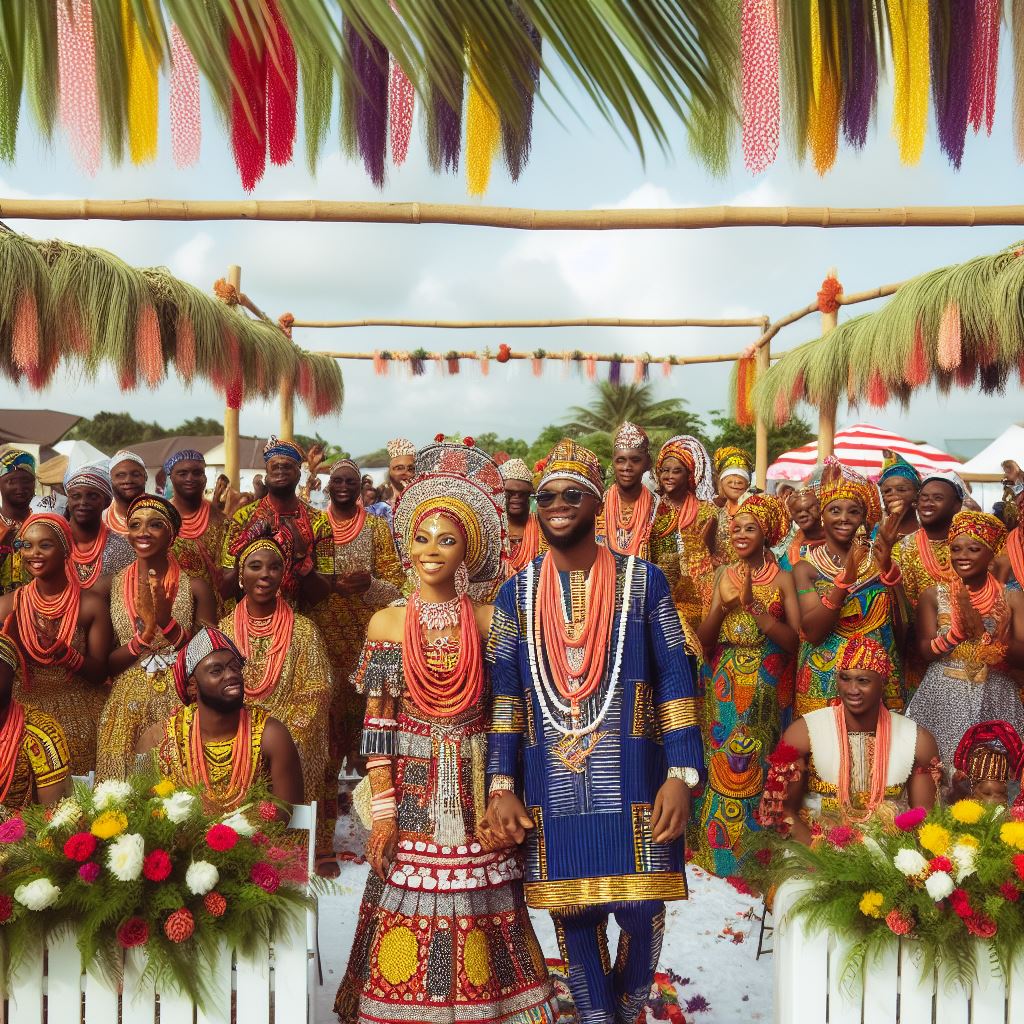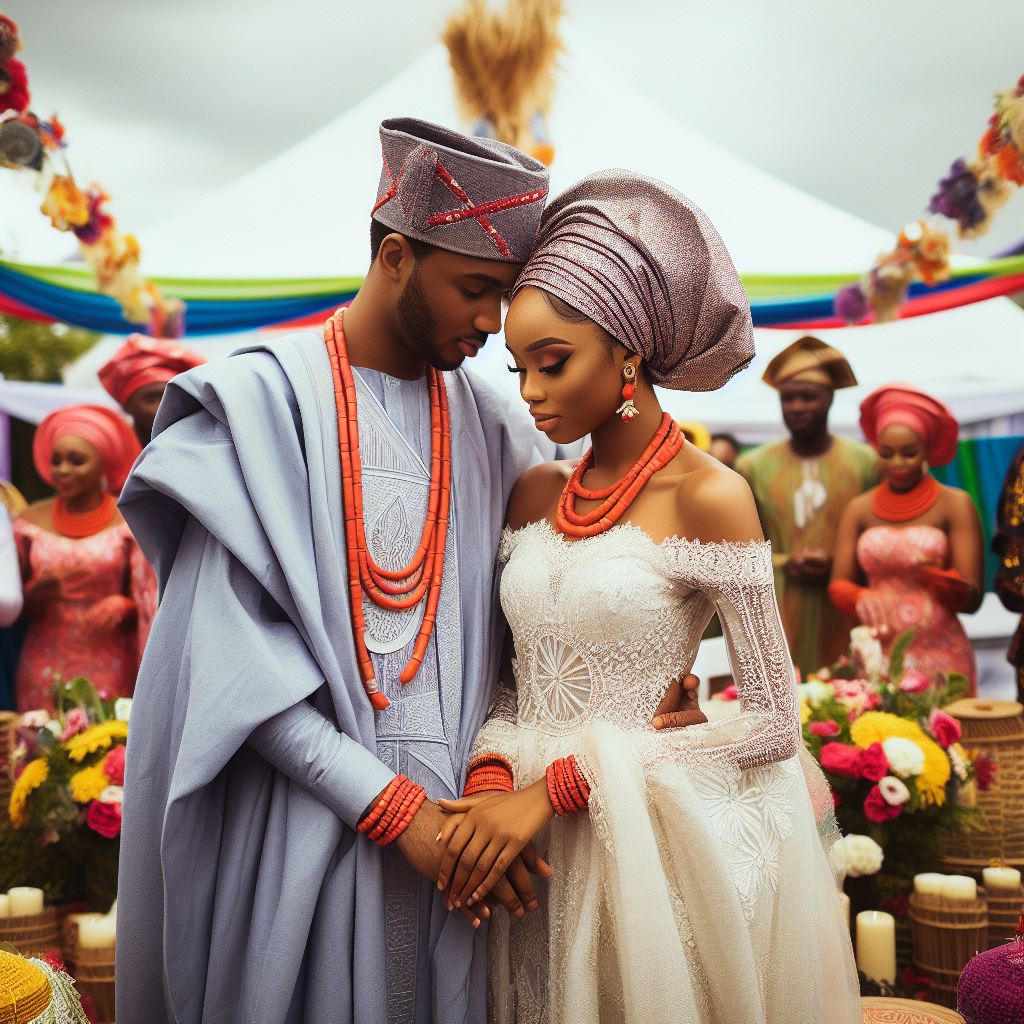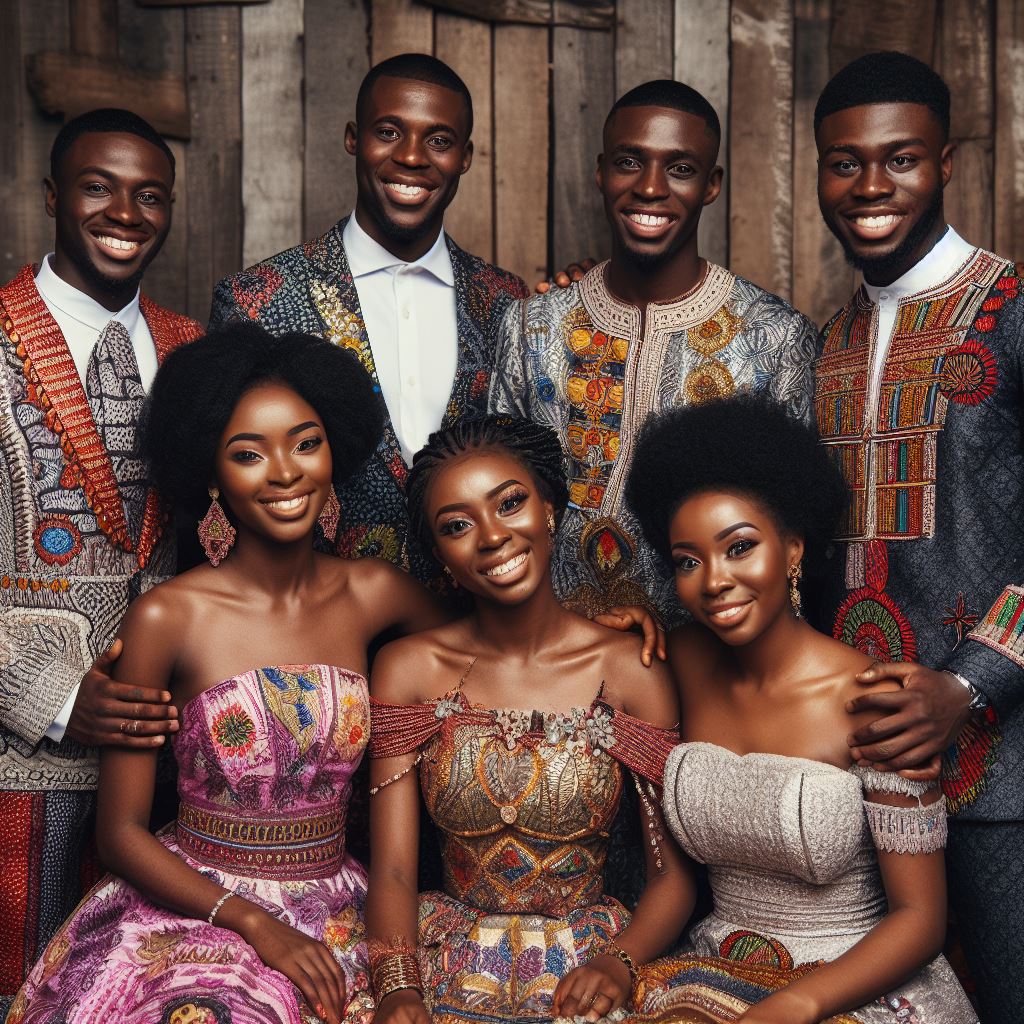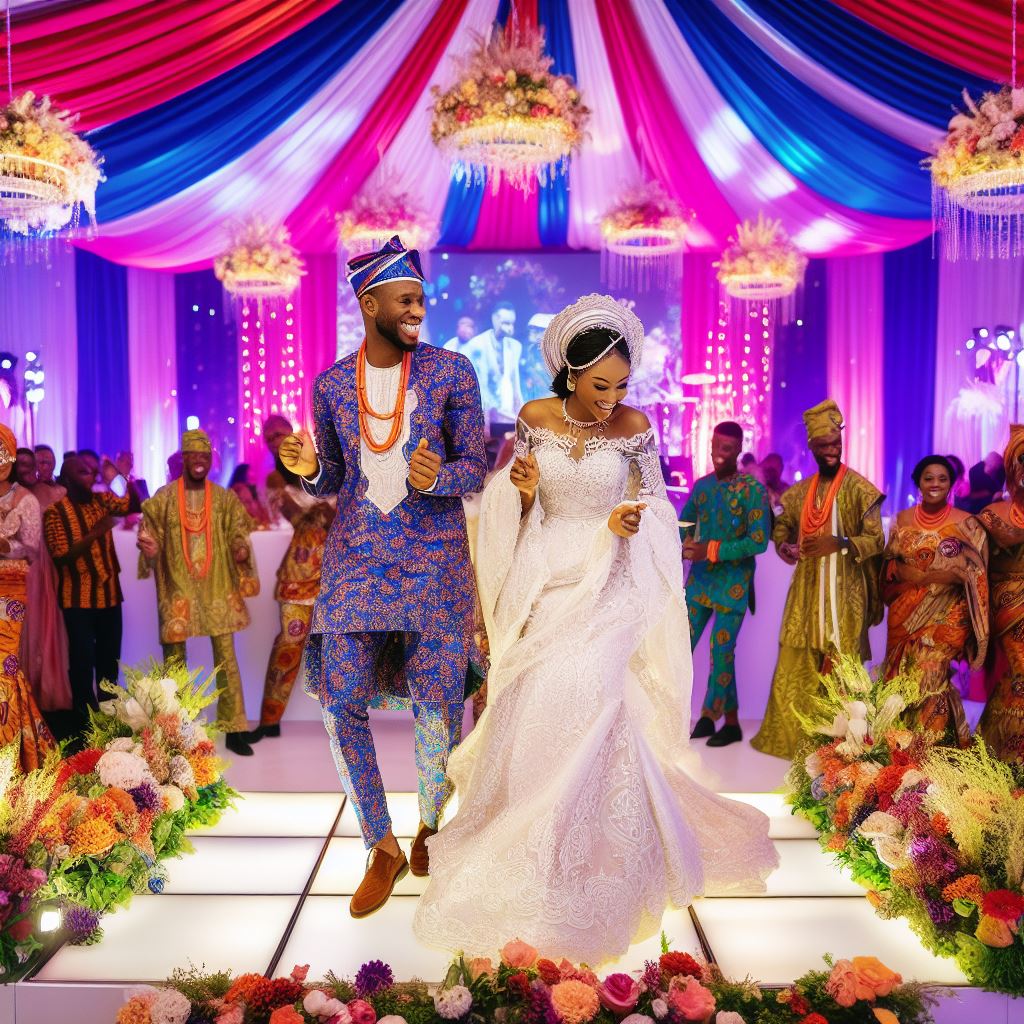Introduction
Nigerian Cultural Riches
Nigeria’s cultural tapestry is a vibrant mosaic, steeped in traditions passed down through generations.
With over 250 ethnic groups, its diverse customs, rituals, and values are a testament to the country’s rich heritage.
Reality TV Fever
In recent years, Nigeria has witnessed an explosive surge in reality TV shows.
Programs like “Big Brother Naija” and “Ultimate Love” have captured the nation’s collective imagination.
Millions tune in, eagerly following the lives of contestants, a testament to the genre’s popularity.
Blurring Reality and Culture
Yet, what’s intriguing is how these reality shows often mirror, or sometimes even amplify, elements of Nigerian cultural practices.
From familial bonding to tribal alliances, reality TV showcases aspects of everyday life that Nigerians can relate to.
In this blog post, we delve into the intriguing phenomena of reality TV reflecting, and sometimes reshaping, the contours of Nigerian culture.
We’ll explore how these shows, while designed for entertainment, end up blurring the lines between scripted drama and real-life cultural expression.
Overview of Nigerian Cultural Practices
Traditional Nigerian cultural practices are deeply ingrained in the society and hold significant importance.
Key aspects of Nigerian cultural practices
They encompass various aspects, including marriage, courtship, family, and social gatherings.
1. Marriage
- Nigerian marriage customs are diverse, reflecting the country’s multi-ethnic nature.
- Arranged marriages are still prevalent, with parents playing a crucial role in the process.
- Brides often have elaborate ceremonies, including traditional rituals, dancing, and feasting.
- The exchange of dowry or bride price is a common practice and symbolizes commitment.
2. Courtship
- Courtship rituals vary across different Nigerian cultures but are vital in building relationships.
- Expressive gestures and gift-giving are predominant ways to show interest and affection.
- Family involvement and approval are often sought during the courtship phase.
- The process allows couples to understand each other’s backgrounds, beliefs, and values.
3. Family
- The Nigerian family structure usually extends beyond immediate relatives to include extended family members.
- The concept of “Ubuntu” emphasizes collective responsibility and support within the family.
- Elders hold a position of respect and are consulted on important decisions.
- The family unit acts as a central support system, particularly during celebrations and challenges.
4. Social Gatherings
- Social gatherings provide opportunities for Nigerians to celebrate, bond, and showcase their culture.
- Traditional music, dance, and attire are important elements of these gatherings.
- Events like weddings, festivals, and naming ceremonies are joyous occasions.
- Food plays a significant role, with a wide variety of traditional dishes served.
Significance and deep-rooted nature of these practices in Nigerian society
In Nigerian society, these cultural practices hold a deep-rooted significance and are respected by the vast majority.
They create a sense of identity, unity, and continuity, connecting individuals to their roots and heritage.
However, the rise of reality TV shows in Nigeria has influenced and blurred the lines between traditional practices and modern-day entertainment.
These shows often mimic Nigerian cultural practices, incorporating elements of marriage, courtship, family dynamics, and social gatherings.
While some argue that these shows promote cultural preservation and allow audiences to appreciate Nigerian traditions, others express concern about the potential distortion and commercialization of these practices for entertainment purposes.
It is essential to strike a balance between preserving cultural authenticity and adapting to the changing times.
Respectful portrayals of Nigerian cultural practices in reality TV can be a means to educate and showcase the beauty of the country’s traditions to a wider audience.
Basically, Nigerian cultural practices, including marriage, courtship, family, and social gatherings, are integral to the nation’s identity.
They are deeply rooted in society, reinforcing bonds and values that have been passed down through generations.
While reality TV may blur the lines between traditional practices and entertainment, it can also offer a platform for cultural appreciation and learning.
Read: The Social Implications of Shows Like ‘Married at First Sight’ in Nigeria
Rise of Reality TV Shows in Nigeria
Increasing popularity of reality TV shows in Nigeria
Reality TV shows have gained significant popularity in Nigeria in recent years, captivating audiences with their unique blend of entertainment and cultural representation.
Here are some well-known reality TV shows in the country:
- Big Brother Naija: This show, which is a Nigerian version of the international franchise, has become a sensation across the nation.
- The Ultimate Love: This reality TV series focuses on single individuals looking for love and aims to establish lasting relationships.
- Project Fame West Africa: A talent competition that showcases aspiring musicians and helps them launch their careers.
- Who Wants to Be a Millionaire: Originally an international format, this show tests contestants’ knowledge and provides a chance to win big cash prizes.
- Next Movie Star: A reality TV show that searches for talented individuals aspiring to become movie stars.
Factors responsible for the rise in popularity of reality TV shows
The rise in popularity of reality TV shows in Nigeria can be attributed to several factors:
- Entertainment Value: Nigerians love to be entertained, and reality TV shows offer a diverse range of content, including drama, laughter, and suspense.
- Relatability: These shows often feature ordinary people in relatable situations, allowing viewers to connect with the participants on a personal level.
- Cultural Representation: Reality TV shows provide a platform to showcase Nigerian cultural practices, traditions, and languages, promoting inclusivity and diversity.
- Escapism: In a country faced with various socio-economic challenges, reality TV shows offer an escape from reality and serve as a form of entertainment therapy.
- Opportunity for Fame and Success: Many Nigerians are attracted to reality TV shows as they provide a chance for participants to gain fame, recognition, and lucrative opportunities.
The success of reality TV shows in Nigeria has influenced the entertainment industry in numerous ways.
Firstly, they have become significant platforms for advertising and brand endorsement, with companies leveraging the popularity of these shows to reach a wider audience.
Additionally, the success stories of participants on these shows have inspired the emergence of new talent in various fields of entertainment.
Controversies and criticisms
Despite their popularity, reality TV shows in Nigeria have faced some controversies and criticisms.
Some argue that these shows promote unhealthy competition, deceit, and immorality.
Others assert that they overshadow other genres of entertainment and neglect cultural values.
However, proponents argue that these shows provide opportunities for self-discovery, talent showcase, and cultural exchange.
Generally, reality TV shows have experienced a meteoric rise in Nigeria due to their entertainment value, relatability, cultural representation, escapism, and the lure of fame and success.
They have not only captivated Nigerian audiences but also transformed the entertainment industry by creating new opportunities and inspiring emerging talents.
While they may attract both praise and criticism, reality TV shows continue to shape and reflect Nigerian cultural practices.
Read: Opinions Divided: Nigerians React to ‘Married at First Sight’
Intersection of Reality TV and Nigerian Cultural Practices
How reality TV shows in Nigeria have started incorporating traditional cultural practices
The intersection between reality TV and Nigerian cultural practices has become increasingly evident in recent years.
With the rise in popularity of reality television shows, producers have begun to explore and incorporate traditional customs and ceremonies into their programming.
Examples of specific reality TV shows that feature Nigerian customs, traditions, and ceremonies
One example of a reality TV show that features Nigerian customs and traditions is “Big Brother Naija.”
This show brings together a diverse group of contestants who live together in a house while being constantly monitored by cameras.
Throughout the season, viewers get a glimpse into the contestants’ daily lives, which often include traditional practices such as cooking Nigerian dishes, participating in cultural dances, and engaging in conversations about Nigerian history and heritage.
Another notable example is “Ultimate Love,” a reality TV show that focuses on finding true love among a group of individuals.
In this show, contestants are encouraged to embrace their Nigerian cultural practices and showcase them to the audience.
This includes dressing in traditional attire, performing rituals and ceremonies, and demonstrating their knowledge of Nigerian cultural norms.
By featuring Nigerian customs, traditions, and ceremonies on reality TV shows, producers are not only providing entertainment but also educating the audience about the rich cultural heritage of Nigeria.
These shows serve as a platform for showcasing the diversity and depth of Nigerian traditions, often breaking stereotypes and dispelling misconceptions.
Impact of showcasing these practices on a national and international audience
The impact of showcasing these practices on a national and international audience is significant.
Fosters a sense of pride and unity among Nigerians
Nationally, it fosters a sense of pride and unity among Nigerians as they see their cultural practices being celebrated and respected on a popular platform.
It also allows younger generations to connect with their heritage and encourages them to embrace their cultural identity.
Window into Nigerian culture for viewers around the world
Internationally, these TV shows have become a window into Nigerian culture for viewers around the world.
They provide a unique opportunity for people from different backgrounds to gain insight into the customs and traditions of Nigeria.
This exposure helps to promote cultural exchange and understanding, breaking down barriers and fostering appreciation for diversity.
Potential to boost tourism and economic development
Moreover, the incorporation of Nigerian cultural practices into reality TV shows has the potential to boost tourism and economic development.
As international audiences become more familiar with Nigerian customs, there is a growing interest in visiting the country to experience these traditions firsthand.
This tourism influx can contribute to the local economy and create opportunities for cultural exchange and growth.
Essentially, the intersection of reality TV and Nigerian cultural practices has opened up new avenues for showcasing and preserving the country’s rich heritage.
By incorporating traditional customs, traditions, and ceremonies into their programming, reality TV shows have the power to educate, entertain, and promote cultural exchange on both national and international scales.
The impact of these shows goes beyond the realm of entertainment, fostering a deeper appreciation and understanding of Nigerian culture.
Read: Lessons Nigerian Couples Can Learn from ‘Married at First Sight’
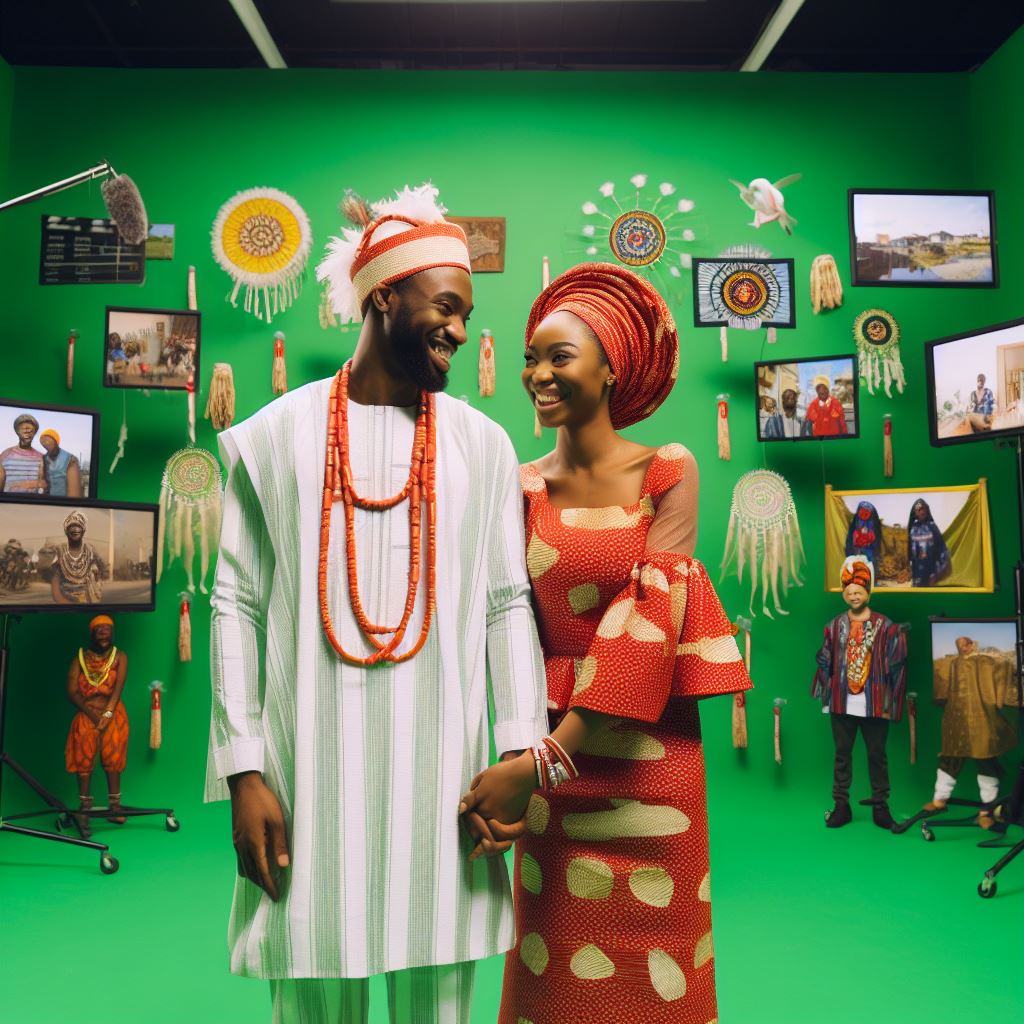
Positive Implications
Reality TV shows that incorporate Nigerian cultural practices have several positive implications.
These shows go beyond entertainment and provide a platform for the preservation and promotion of Nigerian cultural heritage.
By showcasing traditional customs, traditions, and rituals, these shows help to educate viewers about the richness and diversity of Nigerian culture.
Opportunity to explore and celebrate the uniqueness of the Nigerian culture
One of the significant positive aspects of reality TV shows incorporating Nigerian cultural practices is the opportunity to explore and celebrate the uniqueness of the Nigerian culture.
These shows serve as a window into the traditions and way of life of various Nigerian ethnic groups, fostering understanding and appreciation among both local and international audiences.
Preservation and promotion of Nigerian cultural heritage
The preservation and promotion of Nigerian cultural heritage are crucial elements that these shows contribute towards.
By showcasing traditional ceremonies, music, dance, and attire, they help to keep these practices alive and raise awareness about their cultural importance.
This exposure also encourages younger generations to embrace and value their cultural roots.
Educate viewers about Nigerian customs and traditions
Furthermore, reality TV shows that incorporate Nigerian cultural practices can play a significant educational role.
By providing insights into Nigerian customs and traditions, these shows present a learning opportunity for viewers.
They can gain knowledge about different cultural practices, etiquette, traditional values, and social norms.
This understanding promotes cultural sensitivity and intercultural dialogue, fostering a more inclusive society.
Promotion of tourism in Nigeria
These shows also contribute to the promotion of tourism in Nigeria.
By presenting the beauty of Nigerian landscapes, showcasing local artisans, and highlighting diverse cultural practices, they attract tourists who are interested in experiencing the rich cultural heritage of the country in person.
This, in turn, boosts the local economy and creates job opportunities for various stakeholders.
Another positive implication of reality TV shows incorporating Nigerian cultural practices is the potential for cultural diplomacy.
These shows create a platform where different cultures can be celebrated and shared, fostering international understanding and cooperation.
They present Nigerian culture to the world, breaking stereotypes and promoting cross-cultural dialogue.
Stage for talented individuals who showcase traditional music, dance, and other artistic expressions
Additionally, these shows provide a stage for talented individuals who showcase traditional music, dance, and other artistic expressions.
This exposure opens doors for these artists to gain recognition and opportunities to further their careers.
It acts as a platform for cultural ambassadors, allowing them to preserve and exhibit their talents on a larger scale.
In general, reality TV shows that incorporate Nigerian cultural practices bring numerous positive implications.
They contribute to the preservation and promotion of Nigerian cultural heritage, educate viewers about customs and traditions, promote tourism, foster cultural diplomacy, and provide opportunities for talented individuals.
These shows play a vital role in celebrating and preserving the rich tapestry of Nigerian culture for generations to come.
Read: ‘Married at First Sight’: Can Instant Weddings Last in Nigeria?
Gain More Insights: Top Yoruba and Igbo Marriage Anniversary Messages to Share
Delve into the Subject: How Traditional Nigerian Ceremonies Honour the Institution of Marriage
Negative Implications
Potential Negative Consequences
- Blurring reality TV with Nigerian cultural practices can diminish the sanctity of our traditions.
- This merger can lead to cultural insensitivity as these practices become more theatrical than genuine.
- The superficial portrayal of our customs might encourage cultural appropriation and misinterpretation.
- Misrepresentation may fuel stereotypes, affecting our global image and fostering misunderstandings about Nigerian culture.
- Straying from authenticity could lead to a generation growing up with a distorted perception of our heritage.
Commercialization and Exploitation
- The commodification of Nigerian cultural practices for entertainment purposes risks reducing them to mere spectacles.
- Capitalizing on traditions can lead to their commercialization, where their essence is secondary to profits.
- The potential for exploitation is significant, as financial interests often overshadow cultural significance.
- This undermines the intrinsic value of our practices and turns them into cash cows for producers.
- Such monetization can encourage unethical practices, which is a grave concern for cultural preservation.
Distortion and Misrepresentation
- The blurring of lines between reality TV and Nigerian cultural practices can lead to inaccurate portrayals.
- TV producers may exaggerate or misrepresent customs to increase dramatic impact and ratings.
- The risk of cultural distortion is real, as reality TV thrives on sensationalism.
- The misrepresentation of our cultural practices can result in cultural erosion over time.
- Viewers may then form perceptions based on these misrepresentations, perpetuating stereotypes and misunderstandings.
In a world increasingly interconnected through media, it’s essential to acknowledge these negative implications and take steps to preserve the authenticity and significance of Nigerian cultural practices.
Ethical Questions and Debates
Ethical questions surrounding the blurring lines between reality TV and Nigerian cultural practices
- What are the ethical implications of blurring the lines between reality TV and Nigerian cultural practices?
- Is it ethically responsible for reality TV to exploit cultural practices for entertainment purposes?
- Should reality TV be held accountable for accurately representing Nigerian cultural practices, or is some distortion acceptable?
- How does the portrayal of Nigerian cultural practices on reality TV impact the perception and understanding of these practices?
- Are there potential negative consequences of showcasing cultural practices on reality TV, such as cultural appropriation or misrepresentation?
- Does the monetization of Nigerian cultural practices through reality TV devalue the significance and sacredness of these practices?
- What responsibility do reality TV producers have to ensure the informed consent and understanding of participants involved in showcasing cultural practices?
- Can reality TV accurately capture the complexity and depth of Nigerian cultural practices, or does it simplify and commodify them?
- Are there instances where showcasing cultural practices on reality TV can be seen as empowering and educational rather than exploitative?
- What role does audience reception and demand play in the ethical debates surrounding the blurring of lines between reality TV and cultural practices?
Potential criticisms raised by scholars, cultural experts, and the Nigerian community
- Reality TV may perpetuate stereotypes or misrepresent Nigerian cultural practices, leading to misperceptions and misunderstandings.
- The emphasis on drama and conflict in reality TV may overshadow the true essence and significance of Nigerian cultural practices.
- Reality TV may prioritize entertainment value over cultural authenticity, leading to a superficial and distorted representation of cultural practices.
- There is a risk of exploitation, commodification, and the commercialization of sacred and significant cultural practices through reality TV.
- Nigerian cultural practices may be reduced to mere spectacles for Western consumption, reinforcing power imbalances and cultural hegemony.
- The involvement of outsiders in producing and directing reality TV shows may lead to a lack of cultural sensitivity and appropriation of cultural practices.
Ongoing debates regarding the authenticity and appropriateness of showcasing cultural practices on reality TV
- Some argue that reality TV can be a platform for cultural exchange and understanding if done respectfully and with proper consultation.
- Others believe that cultural practices should not be televised as they hold deep spiritual or ceremonial significance that should not be exposed for entertainment.
- There is a need to balance the desire to preserve cultural heritage with the potential benefits of sharing and promoting Nigerian cultural practices on a broader scale.
- The involvement and representation of Nigerians in the creation and production of reality TV shows can ensure a more authentic portrayal of cultural practices.
- It is crucial to consider the intent and impact of showcasing cultural practices on reality TV, weighing the potential benefits against the risks of exploitation.
In essence, the blurring lines between reality TV and Nigerian cultural practices raise various ethical questions and debates.
The potential criticisms, ongoing discussions, and the need for thoughtful consideration emphasize the importance of navigating this intersection with cultural sensitivity and respect.
Balancing the desire for entertainment with the responsibility to accurately represent and preserve cultural practices is crucial in ensuring ethical practices within the realm of reality TV.
Conclusion
This blog post has explored the blurring lines between reality TV and Nigerian cultural practices.
It has demonstrated how reality TV shows in Nigeria have incorporated elements of traditional cultural practices, such as ceremonies and rituals.
The main points discussed include the popularity of reality TV in Nigeria, the use of cultural practices as entertainment, and the potential impact on societal values and norms.
It is important to understand the implications of this blurring of lines between reality TV and cultural practices.
While it provides entertainment and cultural representation, it also has the potential to distort and commodify cultural traditions.
Moving forward, it is crucial to have a critical understanding of the influence of reality TV on Nigerian society and culture.
We should continue to question the motivations behind these shows and their impact on cultural traditions.
In the future, reality TV in Nigeria should strive to strike a balance between entertainment and cultural preservation.
There is a need for more authentic representation of Nigerian cultural practices, while also ensuring ethical and respectful treatment of these traditions.
In a nutshell, the intersection of reality TV and Nigerian cultural practices is a complex and evolving phenomenon.
It requires ongoing dialogue and conscious decision-making to ensure that cultural traditions are respected and preserved in the realm of reality TV.

